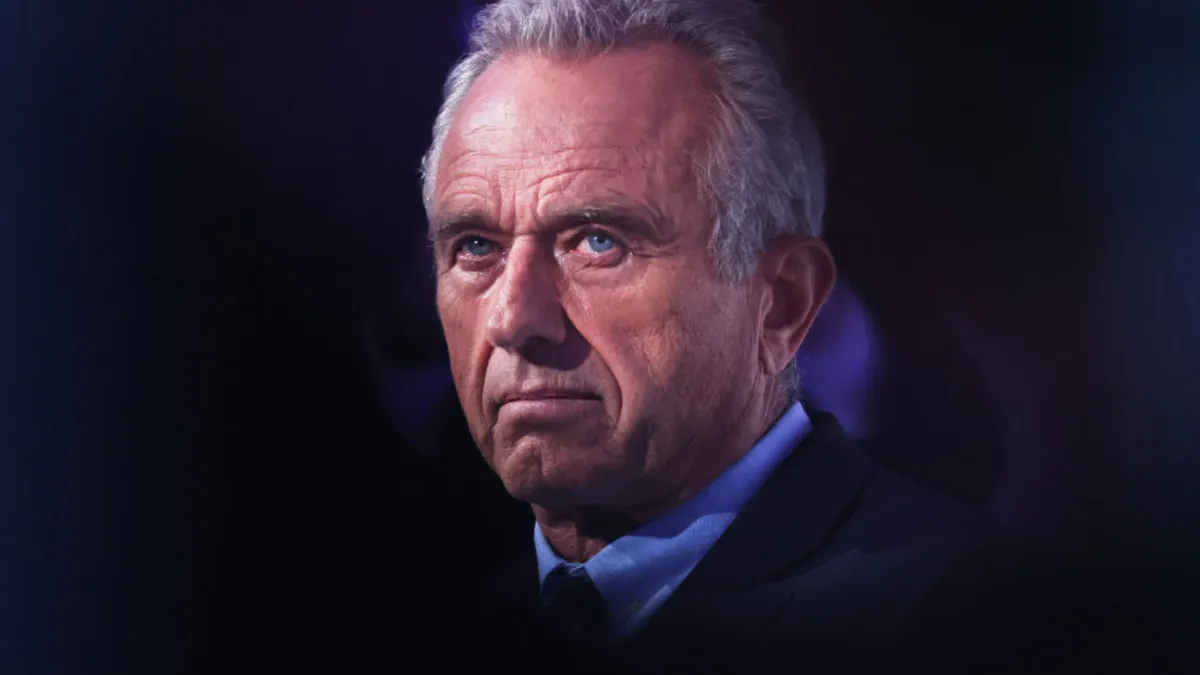With the election decided, one name is suddenly circulating in healthcare: Robert F. Kennedy Jr.
President-elect Donald Trump has promised Kennedy a large role in the new administration and signaled he could be in charge of guiding the nation’s health policies. And Kennedy, who is not a public health or medical expert, has made it clear he intends to make sweeping changes in pharma and healthcare.
This week, Kennedy outlined three goals directed to him from Trump: “clean up corruption,” return agencies to the “gold standard” of science and “Make America Healthy Again.” At the same time, Kennedy noted he and Trump “have not decided yet” on what his official role will be, but he didn’t rule out the possibility of leading the Department of Health and Human Services or acting as a “White House health czar,” potentially overseeing FDA, CDC, CMS, NIH and more.
While his path in the Trump administration is vague, Kennedy’s statements during own run for president outlined his thoughts on public health. Here’s what we know about Kennedy’s stance on various health and pharma issues.
Capping drug prices
Like many political leaders on both sides of the aisle, Kennedy has signaled his support for capping drug costs.
“Legislators should cap drug prices so that companies can’t charge Americans substantially more than Europeans pay,” Kennedy wrote in a Wall Street Journal op-ed in September.
Kennedy pointed to Ozempic, Novo Nordisk’s popular diabetes drug, as an example, noting that in Germany the drug costs less than one-tenth of its cost in the U.S., where the list price is around $1,000 per month.
During his first term, Trump issued an executive order that would have required Medicare to pay no more than the lowest prices in other OECD countries for drugs. CMS proposed what became known as “the most favored nation” model in November 2020, after Trump lost the election, but it was rescinded before the end of the year.
While Trump has since backed away from the policy Kennedy’s post position hints that he could revive the approach.
Vaccines
In the public health sphere, Kennedy is perhaps most well known for his anti-vaccine conspiracy theories. In particular, Kennedy wants to use federal health data to prove vaccines are unsafe, which could get them pulled from the market, Trump transition team officials said in October.
However, Kennedy said this week he “won’t take away anyone’s vaccines” and instead promoted “choice.” Trump has also teetered on his vaccine stance, stating he may still ban some vaccines once in office.
Kennedy’s anti-vaccine rhetoric has raised concern among some experts about what kind of health leader he’d become.
“If [Kennedy] has a significant influence on the next administration, that could further erode people’s willingness to get up to date with recommended vaccines,” Dr. Jerome Adams, who served as surgeon general in Trump’s first administration, said at the American Public Health Association annual conference recently.
Vaccine stocks also slid Wednesday morning. Pfizer, Moderna and BioNTech all saw share prices fall more than 2%, WSJ reported.
NIH funding
Kennedy also wants to upend funding for the National Institutes of Health and has touted a plan to “devote half of research budgets … toward preventive, alternative and holistic approaches to health,” he wrote in September.
Notably, Kennedy said researchers currently don’t have funding to understand underlying issues of disease, such as diet. He has also stated in other interviews that the entire nutrition department of the FDA, which oversees food quality and safety, “[has] to go” because “they’re not protecting our kids.”
Drug ads
Kennedy’s distrust of the pharma industry is also underlined in his aim to revisit direct-to-consumer pharmaceutical ad guidelines.
In an op-ed, Kennedy suggested news channels may be influenced by drug ad revenue in their health news coverage. Pharma companies spent nearly $3 billion last year on advertising for the 10 most promoted drugs.
Obesity and chronic disease goals
Kennedy wants to take up the mantle of battling chronic disease under Trump’s directive with the goal to make substantial improvements among children within two years.
Trump has questioned whether “the overprescription of certain medications” is to blame obesity in the U.S. And Kennedy has postulated that the pharma and healthcare industries profit from chronically sick children.
Some experts have criticized Kennedy for this stance, arguing that effective medicines to treat chronic diseases are necessary and beneficial.
“Kennedy makes it sound as if treating chronic disease is a bad thing,” Former CDC Director Tom Frieden wrote in an op-ed last month. “Nobody wants to have to take medicines to stay healthy, but it’s dangerous to insinuate that medications are the problem.”
Kennedy’s campaign office did not respond to a request for comment.




















